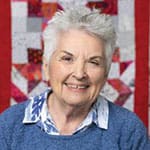Sharon Thayer

A hospital stay can be scary and disorienting in the best of times. In the worst of times, patients and their families need comfort and support. Since 2016, Sharon Thayer has led efforts to provide that comfort and support. As a retired Harborview social worker, Sharon saw the need for a tangible sign of caring and community at the time of a loved one’s last illness, and she committed her time, leadership and skills to become one of the driving forces behind the Comfort Care Quilt Program.
The program is one way UW Medicine improves care for patients at end of life. A quilt with colors or a theme that helps the patient express their personality gives them a representation of themselves as something other than a patient with a difficult diagnosis. The quilt, often one of the last items to touch their loved one, is a gift for the family after the patient’s death.
Over the last eight years, Sharon has sewn over 500 quilts and recruited more than 20 volunteers. Through her donations of time, talent, leadership—and fabric!—Sharon has kept the large group of volunteers engaged and sewing, sharing her enthusiasm and joy as well as her sense of humor throughout.
The impact of the quilt program is perhaps best described by a nurse who cared for the recipient of a quilt: “I was at the bedside of a woman who was dying. Her spouse of 48 years was holding her hand and on her bed was a deep green and purple quilt. She asked that the quilters be thanked for such a beautiful quilt. As she became sleepier and we thought close to death the patient said to her spouse, “I love and will miss you, but you will miss me more.” And he said, “You are right—yet another
argument you win,” which made her smile. We thought those would be her last words but then minutes later she said to her spouse, “Be sure to take this quilt. It is a gift, and it will bring you comfort when I’m gone.”
Sharon’s colleagues describe her as “a tireless advocate for the group, its mission, and its impact” and credit her with the expansion of the program. For her part,
Sharon is quick to give credit to her fellow volunteers and everyone involved in the program. “It’s such a fabulous volunteer program,” she says. “We get as much or more out of it than the patients. I feel such a satisfaction that my humble hobby can make such a difference in someone’s life.”
For the UW community, Sharon’s gift has helped to change the culture around end-of-life care in the UW Medicine system to be more focused on the patient as a person with individual needs and hopes. Staff have said that they, too, are comforted by being able to do something for the patient and family even when medical treatments are no longer effective. This program would not be able to keep up with the need without volunteers like Sharon. UW Retiree Relations is proud to be able to recognize Sharon’s work with this year’s Distinguished Retiree Excellence in Community Service Award.
“My intention was always not to focus on what is known, what others have done, but to shed light on the history of my community.
”
What continues to motivate your dedication?
Over the years, Sea Mar has raised millions of dollars. And where does that money go? It goes to scholarships for Latinos and Latinas across Washington. If students who got the scholarship and are now in college or university are in financial difficulty, Sea Mar helps them as well. We provide public housing, we offer Christmas parties for those in need across the state.
At this point, it’s not just a dream of realization. You can actually see the effect of the effort. Some of my former students are now practicing, are family doctors at Sea Mar. And you see that and it’s very, very rewarding. You want to continue to do even more.
Has your perspective on community service changed as you’ve gotten older, especially since you retired?
I think that doing what I do only strengthens my commitment and it tells me there is so much else to do. I would like to do much more. My heart really is with Sea Mar and the museum.
I was able to be successful as a historian but also continue to work on behalf of the community, and that is extremely satisfying. I wanted to have a social connection, a social impact, and I’m happy that I did.

